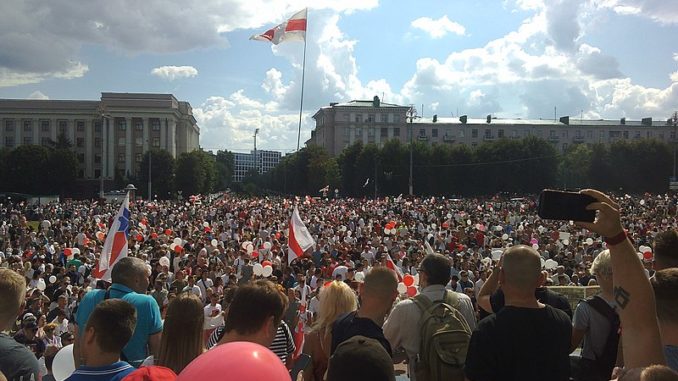
About three hundred workers at the National State TV and Radio Company of the Republic of Belarus have walked off of the job, citing an unwillingness to participate in President Lukashenko’s brutal crackdown on his population. Wide-scale protests have been seen throughout the country in response to what was by all indications a rigged election that the EU has refused to recognize as legitimate.
Alexsandr Lukashenko, after being in power for 26 years, was re-elected with more than 80% of the vote on August 9. The protests started immediately afterward, and the Lukashenko regime’s response was to attack both the protesters and the coverage. According to Amnesty International, at least 55 journalists had been arrested by August 12, with more attacked by police and security forces.
The AP interviewed one of the people participating in the state television walkout:
“There are people killed, raped, thousands are protesting, while they’re saying everything’s fine in the country and nothing is going on.”
“It can’t be like that, people need to get the truth from TV.”
Vyacheslav Lomonosov
Lukashenko has the support of Vladimir Putin. Russian journalists have reportedly been imported to produce news segments for Belarus TV to run, and Russia on Tuesday directly warned both Germany and France not to interfere. China is also heavily invested in the continued political success of Lukashenko, with Belarus forming an important land link in their Belt and Road Initiative.
Despite the firm support Lukashenko has shown over the last four years to both Putin and Xi, President Trump has aggressively moved to normalize relations with Belarus. In 2006, President George W. Bush pushed through economic sanctions against the country following election improprieties and reports of some official oppression of protesters. In 2008, again during Bush, those sanctions were increased. In 2015, after Belarus released some political prisoners, President Obama loosened some of the sanctions as a way to support positive behavior. In 2019, citing unspecified steps and with no material evidence, the Trump administration determined Belarus to have made toward improving human rights and exchanged ambassadors as a step toward full normalization of relations.
Germany’s ability to interfere is likely to be hampered, no matter how much they might desire to defend human rights and democracy, by the recent decision to remove 12,000 US troops from that country. The American retreat removes a threat to Russia’s continued expansion into Eastern Europe, but it also undermines the ability of Western European countries to use their troops in support actions without leaving themselves open to direct attack by Russia.
This looks to have the potential to be a key moment in Belarus history. The removal of Lukashenko would deal strong blows to the expansionist efforts of both Russia and China. Unfortunately, the United States is showing no interest in taking advantage of the geopolitical opportunity.
President Trump is currently deferring to Russia on the matter. He has said on Tuesday that he would speak with Putin about Belarus at the appropriate time, and that the protests seem peaceful.

1 Trackback / Pingback
Comments are closed.